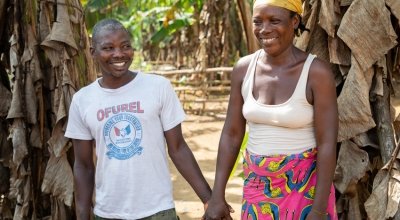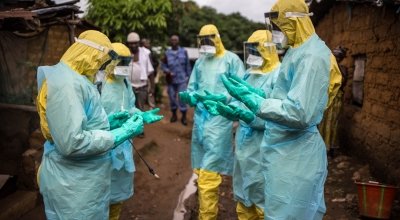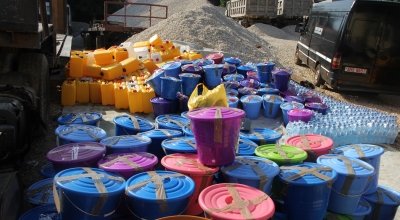
Read our 2023 annual report

Knowledge Hub
My experience volunteering with Concern in Sierra Leone

Carlos Velazquez took up a Monitoring and Evaluation position in Sierra Leone as part of the EU Aid Volunteer programme. Here he shares his experiences of a role that brought him into the heart of the communities that Concern works with and challenged his preconceptions about working with data.

When I accepted a position as an EU Aid Volunteer with Concern, I had some preconceived ideas of what the experience was going to be like. As the role was in Monitoring and Evaluation (M&E), I had prepared myself for a geeky, desk-based job and envisaged dull unending hours staring at Excel spreadsheets trying to analyse encrypted data.
And yes, while there were some Excel-spreadsheet-staring moments, there was so much more to it that added up to an incredibly rich experience. These are some of the lessons learnt along the way.
Getting out and about
Monitoring cannot be done in the office.
It seems pretty obvious now, but before I landed in Magburaka (my duty station in Sierra Leone) I had not really thought much about this. I travelled often, an average of two hours each way, in order to reach some of the most remote villages in Tonkolili district. From week one, my time was split between office-based tasks and working directly with the communities that Concern supports.
The M&E team consisted of five officers and myself. We were accountable for monitoring every Concern project in the region. It meant a lot of hard work and strict time management, but it also meant a lot of community interaction, something which was crucial to the nature of the job.
Building community relationships
It was through my M&E work in the communities that I really came to understand what Concern’s work is all about. For instance, I coordinated the delivery of the Early Grade Reading Assessment (EGRA), which consists of a series of exercises to measure pupils’ literacy skills. This exercise gave me an insight into the strengths and weaknesses of the education system in the targeted villages.
I also interviewed members of the School Management Committees, dedicated groups of people that ensure children attend school and encourage teachers to work efficiently. And I engaged with Community Facilitators. They are energetic young leaders who gather people in their villages to discuss and solve development issues. For me, it was fascinating to talk with them and learn about the processes they have put in place in order to reduce teenage pregnancy.
By the second or third visit to each village, I was not a stranger anymore.
The teachers knew me, the community leaders knew me and the young people knew me. In carrying out my M&E assignments, not only had I learnt a great deal about life in rural Sierra Leone, but I had also built and strengthened the ongoing relationships between Concern and the communities we work with.
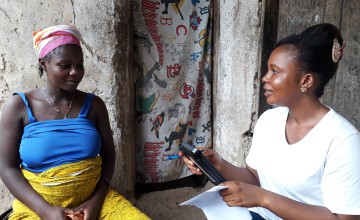
From paper to implementation
Gathering data doesn’t always go according to plan. Like the time we were surveying households for the malaria prevention project. To ensure a random sample of respondents, we had planned to use a ‘cluster sampling’ method. It seemed easy on paper: survey a house and then skip the next one. But it wasn’t so simple to execute in the villages where Concern works. Houses don’t appear in neat and tidy rows, but seem to pop up around patches of fertile land instead. Any house surrounding the initial house could have been considered ‘the next one’. This really pushed us to make decisions on our feet and adapt our sampling methods to the given context.
The social side of data collection
When I first imagined the data collection process, I thought we would be completing surveys in more or less quiet places and without any distractions around us. Incorrect.
Some of our M&E visits to the villages felt almost like social events.
Most people wanted to be interviewed and, even if they were not part of the target population, there seemed to be a natural willingness to take part in the process or to ask us about the purpose of it. It was important to explain the purpose of the survey to everyone who enquired. It was also crucial to clarify that the participation in the survey was voluntary and was not linked to any direct benefit. This approach avoided misunderstandings and mitigated potential conflicts in the community.
A collective effort
Once we had identified a person to survey, it was time to sit down and complete the interview. This was, without a doubt, my favourite part. I collected data whilst sitting on green fields of fluffy grass; reclined against a palm tree; under a tiny hay thatched roof that protected me from some biblical-type torrential rain; inside a mud-and-straw-built school or under a loaded mango tree outside a health facility.
The team typically worked in pairs – one person organised and registered the participants while the other asked the questions.
Women were normally keen to take part in the surveys and happy to express their thoughts. They would gather and listen attentively to all the questions we had for them. They all laughed together with some of the answers and, at some points, they supported each other to answer the questions. Men often seemed a bit shyer, but sporadically they also occasionally joined the process.
Closing the circle
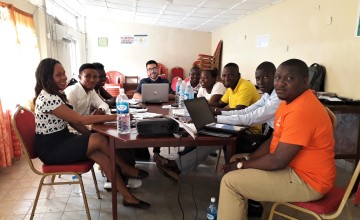
When data was collected successfully, it was time for data cleaning and analysis. The results showed crucial information with key implications for Concern’s programmes. For instance, in one village, 90% of the women had never been to school; 60% of children aged seven were not able to read; the closest medical facility was one hour away and 90% of the villagers were farmers but they still experienced hunger between August and October.
Collecting all this data was an unforgettable experience, but ultimately, what we really cared about in M&E was how to use it in a way that supported Concern's mission of lifting people out of poverty. The data only became useful when we shared it with the programme team. In this way, it was not just used to measure outcomes, it also reshaped our thinking about the projects, helping to make them more impactful and life-changing.
Think twice
I used to think M&E was a box-ticking exercise within the project management cycle. I also used to think that it would be far too technical for me to understand or partake in. After volunteering with Concern, I realised that M&E is an extremely varied and fascinating field of work. It gave me a real insight into a variety of projects. It allowed me to observe the changes taking place as a result of Concern’s interventions and it gave me a chance to shape the process to make it more effective.
Is working in M&E challenging? Yes, but it is not inaccessible. Monitoring and Evaluation is an ideal field for those who constantly love learning and who are eager to find out the why and the how behind the development process. Are you up for the challenge?
Learn more about our EU Aid Volunteer programme
Monitoring and Evaluation is just one of many fields open to our EU AID Volunteers. Learn more by checking out our current opportunities with the programme.



